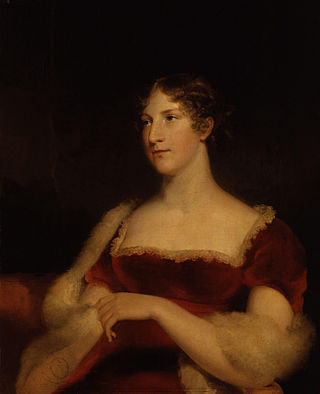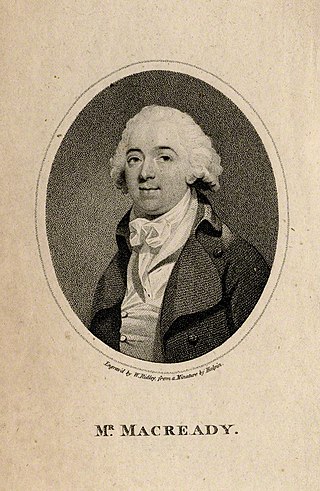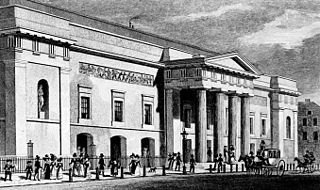
William Abbot or Abbott was an English actor, and a theatrical manager, both in England and the United States.

William Charles Macready was an English stage actor. The son of Irish actor-manager William Macready the Elder he emerged as a leading West End performer during the Regency era.

Charles Kemble was a Welsh actor of a prominent theatre family.

Elizabeth O'Neill, also Eliza, was an Irish actress.

Richard Lalor Sheil, Irish politician, writer and orator, was born at Drumdowney, Slieverue, County Kilkenny, Ireland. The family was temporarily domiciled at Drumdowney while their new mansion at Bellevue, near Waterford, was under construction.

Charles Mayne Young was an English actor. He was born to a respected London surgeon (doctor). His first stage appearance was in Liverpool on 20 September 1798, where he played a Young Norval in Home's blank verse tragedy Douglas. Young's first London appearance was in 1807, as Hamlet with his friend Charles Mathews playing Polonius. "With the decline of John Philip Kemble, and until the coming of Kean and Macready, he was the leading English tragedian". He retired in 1832 in a farewell performance playing Hamlet with, as a special honour to him, Mathews as Polonius and Macready as the Ghost.
John Cooper (1793–1870), was a British actor active between 1811 and 1859, who played in "a singularly large number of parts, some of them of leading importance" in many locations in England, Wales and Scotland.
Daniel Egerton (1772–1835) was an English actor.

Daniel Terry (1780?–1829) was an English actor and playwright, known also as a close associate of Sir Walter Scott.

George Soane (1790–1860) was an English writer and dramatist.

William Macready the Elder (1755–1829) was an Irish actor-manager.
Thomas Simpson Cooke was an Irish composer, conductor, singer, theatre musician and music director – an influential figure in early 19th-century opera in London.
Crow Street Theatre was a theatre in Dublin, Ireland, originally opened in 1758 by the actor Spranger Barry. From 1788 until 1818 it was a patent theatre.

James Prescott Warde (1792–1840) was an English actor. He came up as a provincial tragic actor, in the Garrick mould. The Dictionary of National Biography says he was "full of promise at the time of his first appearance in London", in 1818, but did not reach the top ranks of the profession.
Laurence Clinch was an Irish actor, familiarly known as Larry, and accomplished in both tragedy and comedy. The popular farce St Patrick's Day was written and performed to showcase his particular talent.
Montague Talbot (1774–1831) was an Irish stage actor and theatre manager.

Swedish Patriotism is an 1819 stage melodrama by the British writer and actor William Abbot. It premiered at the Theatre Royal, Covent Garden on 19 May 1819. The London cast included Daniel Terry as Colonel Walstein, Abbot as Captain Albert, Maria Foote as Ulrica, John Liston as Walter, William Chapman as Cokaski, Charles Connor as Colonel Langstorff and Daniel Egerton as Count Cronstedt. It then appeared at the Park Theatre in New York on 1 December 1819 with Robert Maywood as Walstein.

Thomas Comer (1790–1862) was a British stage actor. Comer was born in Bath in Somerset. After appearing in the West End at the Drury Lane and Covent Garden theatres, he emigrated to the United States and established himself as a leading music director, working at the Boston Theatre for many years.
Adelaide is an 1814 tragedy by the Irish writer Richard Lalor Sheil. It premiered at the Crow Street Theatre in Dublin on 19 February 1814. The Dublin cast included Elizabeth O'Neill in the title role and Charles Connor as Count Luneburg. On 23 May 1816 it appeared for the first time in London's West End at the Theatre Royal, Covent Garden. The first London cast featured Elizabeth O'Neill reprising her Dublin role as Adelaide, Charles Mayne Young as Count St. Evermont, Charles Kemble as Count Lunenburg, William Abbot as Albert, Charles Murray as Godfrey, Daniel Egerton as Colbert, Sarah Egerton as Madame St. Evermont and Maria Foote as Julia. It takes place in Germany amidst emigres who have fled from the French Revolution.

William Chapman was a British stage actor active in the late eighteenth century and early nineteenth century. Considerable uncertainly exists about his early biography, but he became an established performer in London's West End at the major theatres Covent Garden, Drury Lane and Haymarket. Considerable crossover may exist with other actors of the era named Chapman.














